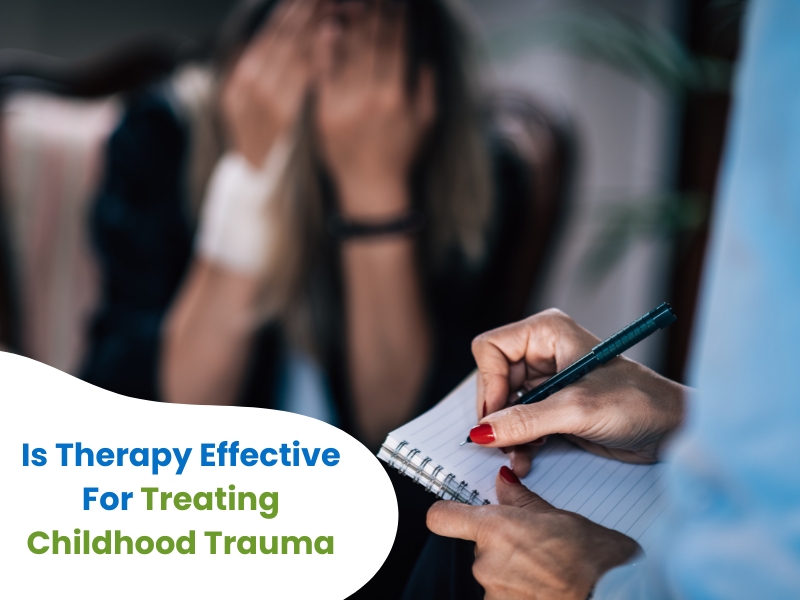Childhood trauma can have lasting effects on a person’s mental and emotional well-being. Whether it’s caused by abuse, neglect, or witnessing traumatic events, the impact can extend well into adulthood. Therapy offers a way to help individuals heal and move forward. But is therapy truly effective for treating childhood trauma? In this article, we’ll explore how therapy can help, the different types available, and why personalised care is crucial for recovery.
What is childhood trauma, and how can it impact your life?
Childhood trauma refers to distressing or harmful experiences that occur during childhood, which can significantly affect a child’s emotional and psychological development. The trauma could come from various sources, such as:
- Abuse (physical, emotional, or sexual)
- Neglect (lack of care, attention, or basic needs)
- Witnessing violence or traumatic events (domestic violence, accidents, etc.)
- Loss of a parent (through separation, death, or abandonment)
The effects of childhood trauma are far-reaching and can impact a person’s life in many ways. Children who experience trauma often struggle with the following:
- Emotional regulation: Difficulty managing emotions, leading to anxiety, depression, or anger issues.
- Relationship challenges: Difficulty forming healthy attachments or trusting others.
- Low self-esteem: A negative self-image that may stem from feeling unworthy or inadequate.
- Behavioural problems: Engaging in self-destructive behaviours or acting out in school or at home.
The earlier the trauma, the greater the chance it will shape an individual’s personality and coping mechanisms throughout life.
How can therapy help in treating childhood trauma?
Therapy is a powerful tool for healing childhood trauma, as it helps individuals process their experiences and gain an understanding of the effects of trauma in a safe and supportive environment. Here’s how therapy can support trauma recovery:
- Emotional expression: Therapy provides a safe space for individuals to express emotions they may have bottled up for years.
- Trauma processing: Therapy helps individuals confront and make sense of traumatic memories, reducing the power those memories hold over them.
- Coping strategies: Therapists teach clients healthy coping mechanisms for dealing with stress, anxiety, and other trauma-related symptoms.
- Building resilience: Therapy fosters personal growth and helps individuals build resilience, which is crucial for overcoming past trauma and moving forward.
What are the different types of therapy for childhood trauma?
Several types of therapy can be particularly effective in treating childhood trauma. Here are some commonly used therapeutic approaches:
- Cognitive Behavioural Therapy (CBT): This evidence-based therapy helps individuals identify and change negative thought patterns, which is essential for overcoming negative thoughts and emotional distress.
- Trauma-Focused Cognitive Behavioural Therapy (TF-CBT): Specifically designed for trauma recovery, TF-CBT helps children and adults process trauma in a safe and structured way.
- Play Therapy: This therapy is used primarily with children. Play therapy helps children express their feelings, understand their emotions, and develop healthy coping strategies.
- Eye Movement Desensitisation and Reprocessing (EMDR): A specialised therapy that helps individuals process and heal from traumatic memories by using bilateral stimulation (such as eye movements).
- Dialectical Behaviour Therapy (DBT): This therapy helps individuals develop skills for managing emotions, improving relationships, and reducing self-destructive behaviours.

The therapists at Auburn Health Centre offer various therapies, including psychology, counselling, and occupational therapy, designed to cater to each individual’s specific needs.
Why is personalised therapy necessary for trauma recovery?
Personalised therapy is essential when treating childhood trauma because each person’s experience is unique. What works for one individual may not be suitable for another, and a one-size-fits-all approach can be ineffective. Here’s why personalised therapy is so important:
- Tailored approach: Personalised therapy ensures that treatment is designed to meet the specific needs of the individual. It takes into account the person’s history, emotional needs, and coping mechanisms.
- Building trust: A personalised approach fosters a more potent therapeutic relationship. When clients feel that their needs are understood, they are more likely to open up and engage in the process.
- Better outcomes: Personalised therapy can lead to more effective outcomes, as clients are more likely to feel supported and motivated to engage in their healing journey.
- Faster healing: By targeting specific areas of trauma, personalised therapy can help individuals heal more quickly and effectively than more generic approaches.
At Auburn Health Centre, personalised care is at the core of their therapeutic approach. Each client receives a treatment plan tailored to their individual needs, ensuring the best possible outcomes.
Can group therapy offer support for those dealing with trauma?
Group therapy can be beneficial for adults dealing with trauma. It provides a sense of community and support, which can be particularly helpful for those recovering from childhood trauma. Here’s how group therapy can aid in the healing process:
- Sense of connection: Group therapy offers participants a chance to connect with others who share similar experiences, reducing feelings of isolation.
- Shared healing: Listening to others’ stories and sharing your own can be a powerful way to heal, as it helps individuals realise they are not alone in their struggles.
- Skill-building: Group therapy often includes activities or exercises designed to teach coping strategies, emotional regulation, and healthy communication skills.
- Supportive environment: Being in a group of people who understand your struggles can be empowering and provide the encouragement needed to continue healing.

While group therapy can be helpful for many, it’s important to remember that therapy should always be tailored to the individual’s needs. Therapists can offer guidance on choosing the most suitable treatment options, whether through individual or group therapy.
How do you know when therapy is working?
It’s not always easy to know when therapy is making a difference. Still, some common signs indicate progress:
- Improved emotional regulation: You may notice that you can manage your emotions better, even when faced with stress or difficult situations.
- Positive changes in behaviour: You might start engaging in healthier behaviours or develop more positive relationships with others.
- Reduced trauma-related symptoms: Symptoms such as anxiety, nightmares, or flashbacks may begin to lessen over time.
- Increased self-esteem: As you work through the trauma, you may start to feel better about yourself and your ability to cope with challenges.
Progress can vary from person to person, and healing is a gradual process. The key is consistent therapy and an open mind, willing to work through difficult emotions and memories. Auburn Health Centre’s compassionate therapists guide clients through this process with care and professionalism.
Get the support you need
If you or your loved one are struggling with childhood trauma, therapy can offer a path to healing. Auburn Health Centre offers personalised therapeutic support services, including psychology, counselling, and early childhood intervention, to help individuals work through trauma and build a better future.
Our team is dedicated to providing compassionate care and creating personalised treatment plans that cater to each client’s unique needs. Whether you’re seeking individual therapy or exploring other options, we’re here to support you every step of the way.


